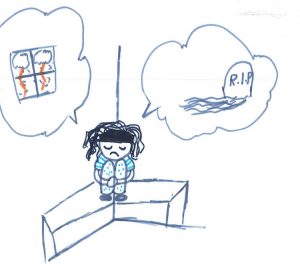Say “Died”: Don’t Lie to Kids About Death
Talking to kids about grief is a classic example of ways adults over-complicate, over-think, and over-explain the ideas of death and what it’s like to miss someone. Talking about death is uncomfortable for a lot of people, mostly because death is something no one wants to think about. Because we would rather avoid the topic than spend time thinking about it, our kids’ understandings of death suffer. From what I have heard and even observed some funeral professionals say about death to their own children is proof that it’s not easy for anyone to tell a sweet child about the finality of death. But we owe them the truth and unfortunately, that is not what children are generally given.
Think about it, in general, we would rather lie to kids than answer them honestly about death.
What are we so afraid of? My guess, if you care to hear it, is that we are afraid of exposing them to pain. It’s with a protective intention that we avoid direct truths but what we are really bringing about is a projection of our own discomfort and fear of death on to these children. When they see our fear, avoidance, and inability to handle the topic they are shown that fear and death are associated and should be avoided at all costs.
So, what if we told the truth? What would happen if we dismissed our fears and could calmly and matter-of-factly answer the question(s) they asked? If we could demonstrate an open acceptance of the fact of death but still convey the difficulty and pain of it, I believe children would not only understand (to whatever degree their experience allows them to), but they would also feel validated and respected enough to know the truth.
Let’s get real with a specialist we had in-house for some training and some examples she gave us of truth-talking about death.
 A Bereavement Specialist from Our House, a grief support center in Los Angeles, came to the mortuary to talk about ways we can help families with children discuss grief. Our staff has a healthy knowledge about topics like these, but I think all of us walked away surprised and relieved by the clarity and ease with which the counselor encouraged us to communicate.
A Bereavement Specialist from Our House, a grief support center in Los Angeles, came to the mortuary to talk about ways we can help families with children discuss grief. Our staff has a healthy knowledge about topics like these, but I think all of us walked away surprised and relieved by the clarity and ease with which the counselor encouraged us to communicate.
She started off by asking us about different euphemisms for death that we have heard, to name a few …
- Passed Away
- Lost
- Gone
- In a better place
- Not here anymore, etc.
 She went on to point out the issue with these phrases, children will take them literally. If we tell a child their grandma is “gone” they will think that she is just “away for a while” because that word carries different inferences for adults than it does children. Or, more tragically, they may think that their “lost” relative is in danger and needs to be found. Our trainer shared about her childhood pet that died and how her parents told her the dog had been taken to a farm where a nice old lady was looking after her with lots of other dogs. The idea that her pet was happier somewhere else without her was painful and failed to bring the comfort her family had intended.
She went on to point out the issue with these phrases, children will take them literally. If we tell a child their grandma is “gone” they will think that she is just “away for a while” because that word carries different inferences for adults than it does children. Or, more tragically, they may think that their “lost” relative is in danger and needs to be found. Our trainer shared about her childhood pet that died and how her parents told her the dog had been taken to a farm where a nice old lady was looking after her with lots of other dogs. The idea that her pet was happier somewhere else without her was painful and failed to bring the comfort her family had intended.
So what is her advice when explaining death? Say it. Say “DIED.” Tell them the truth, they deserve it and, believe it or not, they can handle it. Children are far more resilient than adults, which doesn’t mean that the loss is less painful for them, but rather that they can process the truth with greater success than most adults can.
My favorite walk-away was that children will ask questions when they are ready … you don’t have to over explain, you just need to be patient, listen carefully and answer simply and honestly.
Answer the question that is being asked – it sounds much simpler than it is because we can’t help ourselves once we start explaining something. But try, don’t over-explain or over-whelm the child with more information than they can handle. The answer they seek is what they can take in and if they ask more, they can take in more but if they stop, stop with them.
 She gave us an example of when a child asks a heavy question like, “Is my dad coming back?” she would answer, “No, your dad has died and when someone dies we don’t get to see them here again.” If the child has obtained the information they needed, they’ll go back to playing something or whatever they were doing. If they are ready for more they will continue to ask questions until they reach their threshold.
She gave us an example of when a child asks a heavy question like, “Is my dad coming back?” she would answer, “No, your dad has died and when someone dies we don’t get to see them here again.” If the child has obtained the information they needed, they’ll go back to playing something or whatever they were doing. If they are ready for more they will continue to ask questions until they reach their threshold.
Our trainer asked what we’ve observed children doing at funeral ceremonies, almost in unison our voices said, “playing.” “That’s right,” she said. “Children can participate for a while, they can take in a certain amount of what is going on but then they need a break and so they will go and play.”
We’ve seen this time and time again and I never thought of it as their need for a “break” but it’s so true. It’s exactly like the laughter you tend to hear at funerals. I can’t recall a service where laughter didn’t play some role – it’s the break that we as adults need from the hard truth.
So, in summary:
- Answer honestly
- Move with them, don’t hold them back and don’t leap forward
- Let them take the breaks they need
- Say “died”
You can change the way a person grows up understanding and coping with death for the better, you can change their life by being honest about death.




